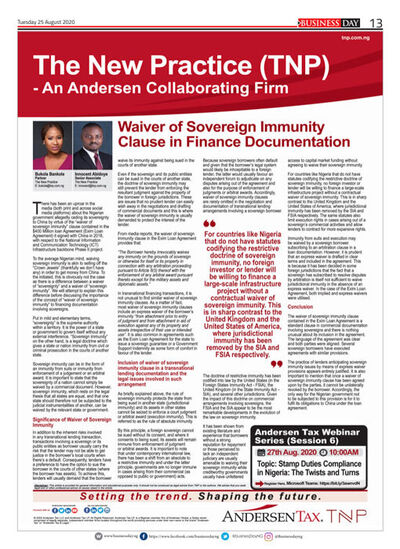There has been an uproar in the media (both print and across social media platforms) about the Nigerian government allegedly ceding its sovereignty to China by virtue of the “waiver of sovereign immunity” clause contained in the $400 Million loan Agreement (Exim Loan Agreement) it signed with China in 2018, with respect to the National Information and Communication Technology (ICT) Infrastructure backbone Phase II project.
To the average Nigerian mind, waiving sovereign immunity is akin to selling off the “Crown Jewels” (thankfully we don’t have any) in order to get money from China. To the initiated, this is obviously not the case as there is a difference between a waiver of “sovereignty” and a waiver of “sovereign immunity”. We will attempt to explain this difference before discussing the importance of the concept of “waiver of sovereign immunity” to financing documentation involving sovereigns.
Put in mild and elementary terms, “sovereignty” is the supreme authority within a territory. It is the power of a state or government to govern itself without any external interference. “Sovereign immunity” on the other hand, is a legal doctrine which gives a state or nation immunity from civil or criminal prosecution in the courts of another state.
Sovereign immunity can be in the form of an immunity from suits or immunity from enforcement of a judgement or an arbitral award. It is important to state that the sovereignty of a nation cannot simply be waived by a commercial document. However, sovereign immunity, which rests on the legal thesis that all states are equal, and that one state should therefore not be subjected to the judicial instrumentalities of another, can be waived by the relevant state or government.
Significance of Waiver of Sovereign Immunity
In addition to the inherent risks involved in any transnational lending transaction, transactions involving a sovereign or its public entities as borrower usually carry the risk that the lender may not be able to get justice in the borrower’s local courts when there’s a default. Consequently, lenders have a preference to have the option to sue the borrower in the courts of other states (where the borrower has assets). To achieve this, lenders will usually demand that the borrower waive its immunity against being sued in the courts of another state.



